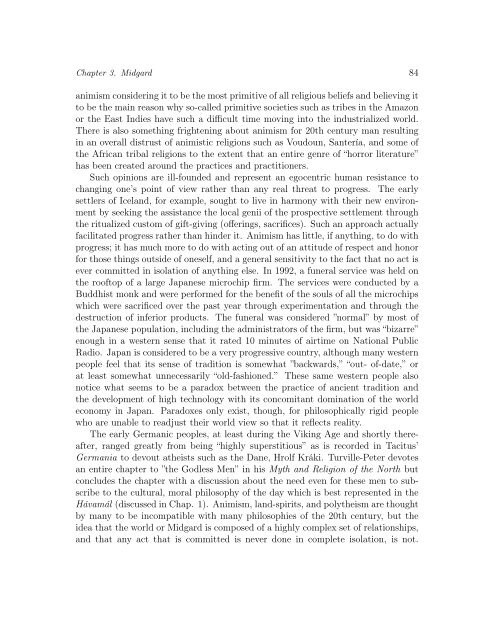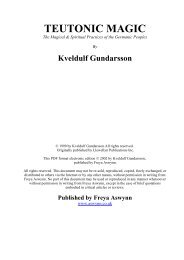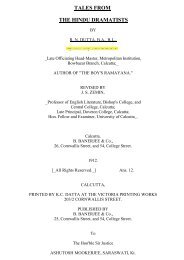Untitled - Awaken Video
Untitled - Awaken Video
Untitled - Awaken Video
Create successful ePaper yourself
Turn your PDF publications into a flip-book with our unique Google optimized e-Paper software.
Chapter 3. Midgard 84<br />
animism considering it to be the most primitive of all religious beliefs and believing it<br />
to be the main reason why so-called primitive societies such as tribes in the Amazon<br />
or the East Indies have such a difficult time moving into the industrialized world.<br />
There is also something frightening about animism for 20th century man resulting<br />
in an overall distrust of animistic religions such as Voudoun, Santería, and some of<br />
the African tribal religions to the extent that an entire genre of “horror literature”<br />
has been created around the practices and practitioners.<br />
Such opinions are ill-founded and represent an egocentric human resistance to<br />
changing one’s point of view rather than any real threat to progress. The early<br />
settlers of Iceland, for example, sought to live in harmony with their new environment<br />
by seeking the assistance the local genii of the prospective settlement through<br />
the ritualized custom of gift-giving (offerings, sacrifices). Such an approach actually<br />
facilitated progress rather than hinder it. Animism has little, if anything, to do with<br />
progress; it has much more to do with acting out of an attitude of respect and honor<br />
for those things outside of oneself, and a general sensitivity to the fact that no act is<br />
ever committed in isolation of anything else. In 1992, a funeral service was held on<br />
the rooftop of a large Japanese microchip firm. The services were conducted by a<br />
Buddhist monk and were performed for the benefit of the souls of all the microchips<br />
which were sacrificed over the past year through experimentation and through the<br />
destruction of inferior products. The funeral was considered ”normal” by most of<br />
the Japanese population, including the administrators of the firm, but was “bizarre”<br />
enough in a western sense that it rated 10 minutes of airtime on National Public<br />
Radio. Japan is considered to be a very progressive country, although many western<br />
people feel that its sense of tradition is somewhat ”backwards,” “out- of-date,” or<br />
at least somewhat unnecessarily “old-fashioned.” These same western people also<br />
notice what seems to be a paradox between the practice of ancient tradition and<br />
the development of high technology with its concomitant domination of the world<br />
economy in Japan. Paradoxes only exist, though, for philosophically rigid people<br />
who are unable to readjust their world view so that it reflects reality.<br />
The early Germanic peoples, at least during the Viking Age and shortly thereafter,<br />
ranged greatly from being “highly superstitious” as is recorded in Tacitus’<br />
Germania to devout atheists such as the Dane, Hrolf Kráki. Turville-Peter devotes<br />
an entire chapter to ”the Godless Men” in his Myth and Religion of the North but<br />
concludes the chapter with a discussion about the need even for these men to subscribe<br />
to the cultural, moral philosophy of the day which is best represented in the<br />
Hávamál (discussed in Chap. 1). Animism, land-spirits, and polytheism are thought<br />
by many to be incompatible with many philosophies of the 20th century, but the<br />
idea that the world or Midgard is composed of a highly complex set of relationships,<br />
and that any act that is committed is never done in complete isolation, is not.
















